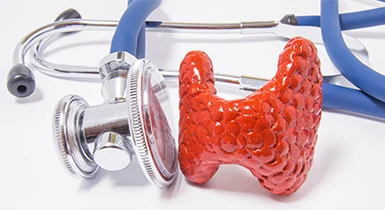The thyroid gland is a tiny gland but performs numerous functions. It is Butterfly-shaped structure; located in front of your windpipe (trachea) below the thyroid cartilage. The main function of the thyroid gland is to produce and releases hormones that regulate metabolism, heart function, digestion, muscle control, bone strength, energy levels, and even mental states.
In women thyroid diseases are very common and are generally overlooked. Thyroid diseases are more prevalent right after pregnancy or menopause, a time when your body is adjusting to so many changes. Thyroid problems can cause severe heart problems, stroke, brittle bones, loss of consciousness, or other serious health problems. Therefore it is essential that it is important to get a thyroid screening (blood test) to know and assess whether the thyroid gland is functioning optimally or not.
The two most common conditions of the thyroid gland are:
- Hypothyroidism: An underactive thyroid producing and releasing too little of the thyroid hormones, known as T3 and T4.
- Hyperthyroidism: An overactive thyroid producing and releasing too much T3 and T4.
Symptoms vary accordingly in both conditions:
| Hypothyroidism | Hyperthyroidism |
| Weight gain | Weight loss |
| Slowed heart rate | Increased heart rate, blood pressure and heart palpitations |
| Tired or sluggish | Anxiety |
| Hair loss | Insomnia |
| Feeling cold more often than usual | Restlessness |
| Dry skin | Irritability |
| Brittle nails | Hair loss |
| Numbness or tingling in the hands | Excessive sweating and an aversion to heat |
| Constipation | Muscle weakness or trembling hands |
| Abnormal menstrual periods | Vision problems |
| Diarrhoea | |
| Irregular menstrual periods |
Thyroid disorders are assessed easily via blood test, and can usually be treated effectively with medication and/or a dietary regimen. In rare cases, surgery may be indicated.
At Wockhardt hospital, our team of endocrinologists diagnose and treat patients with thyroid disorders including hypothyroidism, hyperthyroidism, thyroid nodules and thyroid cancer.
The goals established for treatment of Thyroid treatment basically involves
- Identify the risk factors
- Treat the underlying cause
- Thyroid Replacement Therapy (T3 OR T4 OR COMBINATION)
- Radioactive iodine, Anti-thyroid medications or surgery
- Nutritional supplementation
- Life style modification
- Diet management
- Prevention and treatment of complications
At Wockhardt Hospital, our endocrinology department is supported by state of the art diagnostic services. The clinic carries out a complete thyroid profile, ultrasound, fine needle aspiration cytology, isotope scanning, radio-iodine treatment and surgery.
If you have any of the above symptoms, please visit out Endocrinology department at Wockhardt Hospital for a proper evaluation and treatment.




